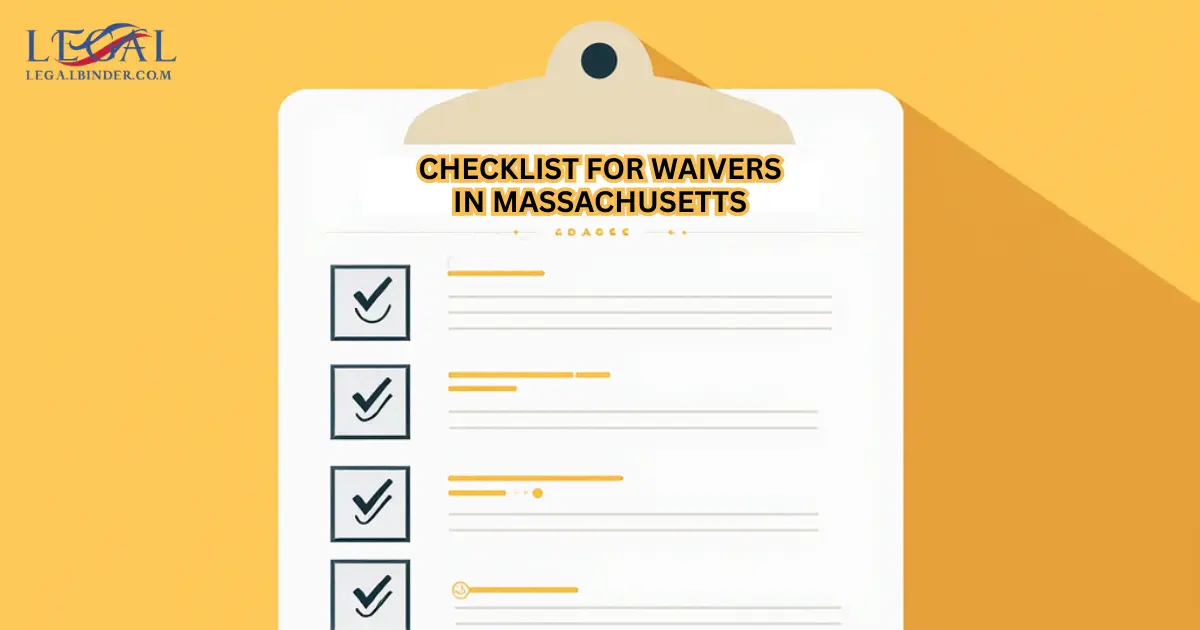Checklist for Waivers in Massachusetts — This complete checklist helps Massachusetts residents prepare and submit waiver requests for court and administrative fees. Use this guide to confirm eligibility, gather the right documents, complete the correct forms, and avoid common mistakes when filing a waiver in Massachusetts courts or state agencies.
Massachusetts-specific procedures matter: follow the steps below, reference official state forms, and keep copies of everything you file to speed review and protect your rights.
Quick Overview / What this Checklist for Waivers in Massachusetts covers
In Massachusetts, a waiver can mean asking a court or agency to excuse payment of filing fees, transcript costs, sheriff/service fees, or appellate fees because paying would create undue financial hardship.
Common waiver types in Massachusetts include:
- Waiver of civil, family, or probate court filing fees due to indigency.
- Requests to proceed in forma pauperis for appeals or trial-level matters.
- Waiver or reduction of transcript, copying, or certification fees.
State-specific Requirements (Checklist for Waivers in Massachusetts)
Massachusetts courts and agencies evaluate waivers under state rules, Massachusetts General Laws, and local court procedures. Judges and clerks look at household income, receipt of public benefits, assets, and necessary monthly expenses when determining indigency.
Primary Massachusetts resources to consult:
Jurisdiction: file your waiver with the clerk of the Massachusetts court handling your case (District, Superior, Probate & Family, or Appeals Court). Administrative waivers follow the specific agency’s rules—verify the agency portal for exact requirements.
Who usually qualifies in Massachusetts
- Individuals receiving means-tested benefits such as SNAP, MassHealth (Medicaid), or SSI generally meet strong presumptive evidence of indigency.
- Low-income households with unavoidable expenses (rent, medical bills) may qualify when documentation shows inability to pay.
- Incarcerated persons and pro se filers have prescribed in forma pauperis routes for appeals in Massachusetts courts.
Step-by-step How to Complete & Submit Checklist for Waivers in Massachusetts
Use this numbered checklist to prepare a complete waiver Massachusetts submission.
- Identify the correct waiver type and form. Visit the Massachusetts Court System forms page and locate the indigency or in forma pauperis form for your court level. Agencies may have separate forms.
- Gather supporting documents. Collect recent pay stubs, benefit award letters (MassHealth, SNAP), bank statements, and a government-issued ID.
- Complete the affidavit carefully. Provide full name, case number, court name, household members, monthly income, essential expenses, and any extraordinary costs (medical, childcare).
- Sign under penalty of perjury. Many Massachusetts forms require a sworn affidavit; follow notary and signature instructions precisely.
- Attach documentary evidence. Include copies of benefit letters, pay stubs, bank statements, or creditor letters supporting your claim of inability to pay.
- File with the clerk or agency. Submit in person, by mail, or via e-filing if available; some Massachusetts counties accept electronic filing—check the court’s page for local e-filing instructions.
- Request a filed-stamped copy and follow up. Keep the stamped copy and monitor the docket or agency portal for orders, hearings, or requests for more documentation.
Typical documents required with a Massachusetts waiver application include:
- Massachusetts indigency affidavit or in forma pauperis form (available at Massachusetts Court System forms).
- Proof of public benefits (MassHealth, SNAP, TANF award letters).
- Recent pay stubs (last 1–2 pay periods) or employer income verification.
- Bank statements for the prior 1–3 months, if requested.
- Valid Massachusetts ID (driver’s license or state ID) and copies of case pleadings or appeal notices.
Processing Time, Fees and Deadlines Checklist for Waivers in Massachusetts
Filing a waiver application is typically free in Massachusetts. Processing times vary by court and county.
- Processing time: Clerks usually forward affidavits to the judge within days; decisions may take a few days to several weeks depending on caseload.
- Fees: No fee to submit the waiver form. If the court denies the waiver, you remain responsible for filing fees, transcript costs, and any required bonds.
- Deadlines: Submit the waiver with your initial filing or before an appeal deadline to avoid dismissal or forfeiture of rights.
Common Mistakes to Avoid Checklist for Waivers in Massachusetts
- Using an outdated form—always download the latest version from the Massachusetts Court System forms page.
- Failing to attach supporting documentation; unverified assertions often result in denial.
- Leaving required fields blank or providing inconsistent income data across documents.
- Not filing in the correct court or omitting the case number.
- Not keeping a stamped copy of the filed waiver for your records.
Download official Massachusetts forms and confirm local procedures at these authoritative sources:
FAQs
A: Use the indigency or in forma pauperis form available from the Massachusetts Court System forms page. Check with the county clerk for any local variations.
Q: Is a waiver granted automatically in Massachusetts?
A: No. A judge will review your affidavit and supporting documents and may deny the waiver if you can reasonably pay the fees.
Q: Can I request waiver of appellate fees in Massachusetts?
A: Yes. File the appropriate in forma pauperis or appellate indigency request before the appeal deadline to seek relief.
Q: What if my waiver is denied?
A: If denied, you must pay the fees to proceed. You may submit additional evidence, reapply, or seek help from legal aid organizations or a private attorney.
Q: Where can I get help filling out the waiver?
A: Contact county clerk self-help desks, Massachusetts legal aid organizations, or law school clinics like Harvard Law’s clinics for guidance and document review.
Conclusion & Call to Action
Following this waiver Massachusetts checklist increases the chance of a favorable decision: use the correct form, attach clear supporting documents, and file promptly with the appropriate court or agency. Start by downloading the current indigency or in forma pauperis form from the Massachusetts Court System forms page.
For official forms and county contact information visit Massachusetts Court System — Forms and Mass.gov. For templates and related guides, visit USAlegalBinder.com or consult a qualified Massachusetts attorney for case-specific advice.
